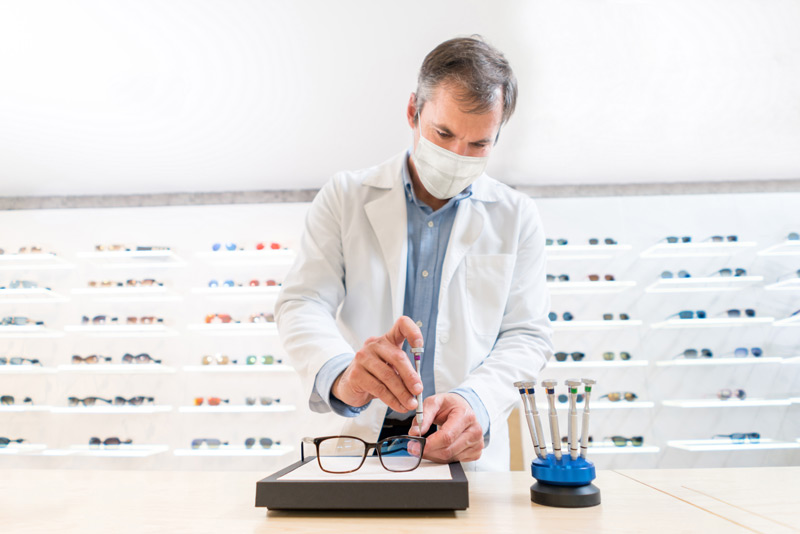An optician is an eye care specialist who helps you choose the right eyeglasses, contact lenses or other vision correction devices. They can’t diagnose or treat conditions that affect your eyes or vision. They’ll work with you to get the right corrective lenses after your optometrist or ophthalmologist gives you a prescription.
Advertisement
Cleveland Clinic is a non-profit academic medical center. Advertising on our site helps support our mission. We do not endorse non-Cleveland Clinic products or services. Policy

Image content: This image is available to view online.
View image online (https://my.clevelandclinic.org/-/scassets/images/org/health/articles/24404-optician.jpg)
An optician (pronounced “op-TISH-in”) is an eye care specialist who helps you choose the right eyeglasses, contact lenses and other vision correction devices. They work with ophthalmologists and optometrists to take care of your eyes.
Advertisement
Cleveland Clinic is a non-profit academic medical center. Advertising on our site helps support our mission. We do not endorse non-Cleveland Clinic products or services. Policy
Your optician will help you find the right glasses or contacts after your optometrist or ophthalmologist prescribes them.
Opticians aren’t medical doctors (MD) or doctors of osteopathy (DO). They don’t diagnose or treat issues that affect your eyes and vision.
Opticians are technicians who receive specialized training to help ophthalmologists and optometrists before, during and after your eye exam.
In the U.S., every state has different laws and requirements for someone to be an optician. Opticians usually need a high school or equivalent diploma, depending on where they work.
Opticians in most states need a license to practice. License requirements are different in each state, but they usually require opticians to have a technical degree (like an associate’s degree). Many states require opticians to work a set amount of time (either a number of years or hours) before they’re fully licensed.
Opticians help you choose eyeglasses and contacts that fit your vision needs.
They’ll explain which options are available based on your prescription and any other conditions you have. Your optician will also fit your corrective lenses. They’ll adjust your eyeglass frames to fit your face and can show you how to wear your contacts safely.
Advertisement
Your optician will also assist your eye care specialist before, during and after your routine eye exam.
Opticians can’t diagnose or treat conditions that affect your eyes. They work with optometrists and ophthalmologists, but don’t provide medical care.
Opticians use prescriptions from your optometrist or ophthalmologist to make and fit corrective lenses that will give you as close to 20/20 vision as possible.
Having your eyes and vision checked regularly can help an eye care specialist identify problems right away. How often you should get your eyes checked usually depends on your age:
You might need your eyes checked more often than this if you wear glasses or contacts or need another type of visual aid. People with diabetes also need their eyes checked more often than what’s listed here.
Ask an eye care specialist how often you need an eye exam.
Tell your provider about any changes in your vision. If you wear glasses or contact lenses, have your eyes examined regularly so your provider can adjust your prescription as often as necessary.
Talk to your provider if you notice any symptoms in your eyes, including:
Opticians and optometrists work together to take care of your eyes and vision.
Optometrists can diagnose and treat issues in your eyes. They’ll also conduct your regular eye exams. They can’t perform surgery on your eyes. If you need eye surgery, your optometrist will refer you to an ophthalmologist.
Opticians work with optometrists and ophthalmologists. They’ll fit you for glasses, contacts or other vision correction aids. They can also adjust or replace your glasses, lenses or frames.
An optician will work with you to make sure your glasses, contacts or other corrective lenses fit properly. They’ll show you how to use and care for your corrective lenses, and can adjust them if something doesn’t feel quite right.
Opticians don’t diagnose or treat new symptoms, so visit an optometrist, ophthalmologist or your regular healthcare provider if you notice your vision changing or experience new symptoms in or around your eyes.
Advertisement

Sign up for our Health Essentials emails for expert guidance on nutrition, fitness, sleep, skin care and more.
Learn more about the Health Library and our editorial process.
Cleveland Clinic’s health articles are based on evidence-backed information and review by medical professionals to ensure accuracy, reliability and up-to-date clinical standards.
Cleveland Clinic’s health articles are based on evidence-backed information and review by medical professionals to ensure accuracy, reliability and up-to-date clinical standards.
Cleveland Clinic’s ophthalmologists and optometrists have the highest training available. We provide exams, vision correction and care for many eye conditions.
